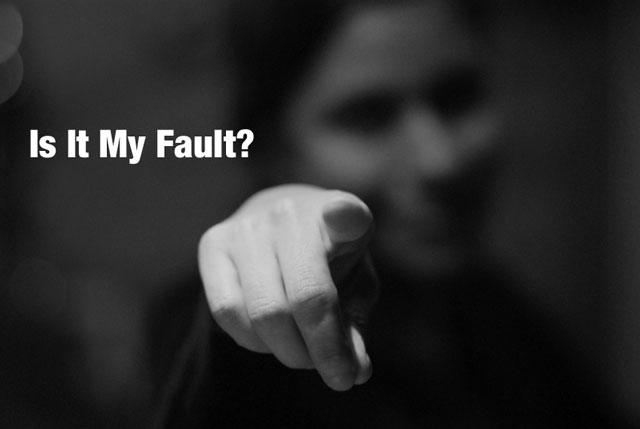By Sandra L. Brown, M.A.
One of the chief complaints of having been with a
pathological is that you 'acquire' his view of you. In previous
articles I discussed the 'pathological
world view' which is the 'lens' through which he sees
himself, others, and the world. This view of the world is processed through his
own pathological disorder which is why his view of the world is not like a normal
person's view. His view is
negative, self- focused, grandiose, paranoid, critical, and self-promoting. He
sees others as always wrong, out to get him, stupid or inept. He sees himself
as right, the victim, or the only one that knows anything at all.
He sees you as the "revictimizer" of him, wonderful and
yet horrible, needed and yet hated, smart yet dependent on him, in need of his
brilliance, faulty without him, as pathological as he is--and the list goes on.
A lot of the work we do with women is to help them
understand that what they are feeling is often the result of HIS pathological
world view-thrust upon and used to define them.
Pathology is the inability to change and sustain change,
grow in any meaningful way, or develop insight about how one's behavior effects other. If
he can't change:
- He projects his inability on you, making the problem in the relationship YOUR fault or YOUR inability to change.
- He acts as if you shouldn't ask him to change, or pretends he has changed, when he hasn't.
- He makes you 'think' you are asking for something huge-something wrong for him to change, OR that only you need changing-he's fine.
If he can't
grow in any meaningful way:
- He projects his non-growth onto the relationship and suggests it's the relationship stagnation you are really experiencing.
- If you could only GROW to accept him in all his pathology, then the relationship would thrive.
If he can't
develop insight about how his behavior affects others:
- He projects his undeveloped insight on you and says these are your traits, and you simply don't understand "what you are doing to him."
- He says all his anger is yours, all his deviancy is yours, you are just as sick as he is which is why you are a great match, all his lying is yours, all his manipulations are yours.
That's
because in pathology they are MASTER PROJECTORS. It is in fact, one of the "symptoms" of pathology. They take
all their pathological attributes and say they are YOURS.
Over a period of time of this intense projection, several
things happen:
- She begins to believe these negative and disturbing attributes really are HER personality.
- She normalizes his behaviors (and the behaviors he claims are hers) so they seen less disturbing to her.
- Her self-esteem drops; she no longer looks for ways to disbelieve him about these attributes.
- If her self esteem drops low enough, she no longer seeks to leave.
Women who seek coaching through our phone support or retreat
programs come in 'programmed' to believe HIS pathology is
actually theirs. Some of our treatment is much like the treatment cult
survivors or hostages would receive when they have been 'brainwashed'
to believe they were bad so they were taken hostage.
Coercion techniques, the Stockholm Syndrome and other
psychological hostage-taking maneuvers are common with women who have been in
severely pathological relationships.
Would you take someone who was held as a prisoner of war and
just send them home and tell them they will be fine? Would you tell them they
don't need specialized
help in order to reform their thinking to their former patterns of thought?
Would you tell them to just go back to work or find someone else or go get on
Match.com and all will be well?
In many cases, I have seen women come to our retreat program
in the same "shape" as people suffering
from Stockholm Syndrome-they
are emotionally, physically, financially, and sexually exhausted. They have
tapes playing in their heads that he is normal and she is sick. They have been
told for so long by a brilliant pathological that they are mentally ill and
should seek treatment. They have been told that everything that is black is
really white, and that everything that is bad is really good.
The Master Projection he uses causes similar symptoms to
people who have been held captive, thrust into cults, or held prisoner in other
people's belief systems.
These are intensely programmed beliefs that are not "removed"
simply because you breakup. Lingering effects means that specialized treatment
is required.
But the first step is recognizing these symptoms in yourself-that HIS pathological
attributes have been assigned to you by him, and quite possibly none of them
are true. Learning to sustain that belief is where help is often needed. Just
for today, allow the possibility that none of what he said is really about you.
See if all those attributes aren't
really his.
Sandra L. Brown is the Founder of The Institute For Relational Harm Reduction and Public Pathology Education. Visit her website if you want to learn more, or to take advantage of her services: http://saferelationshipsmagazine.com










